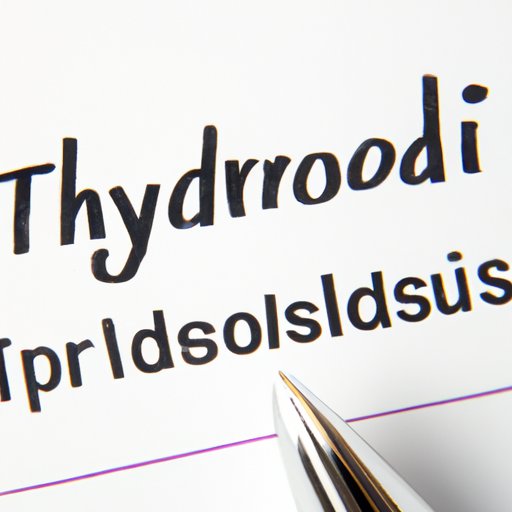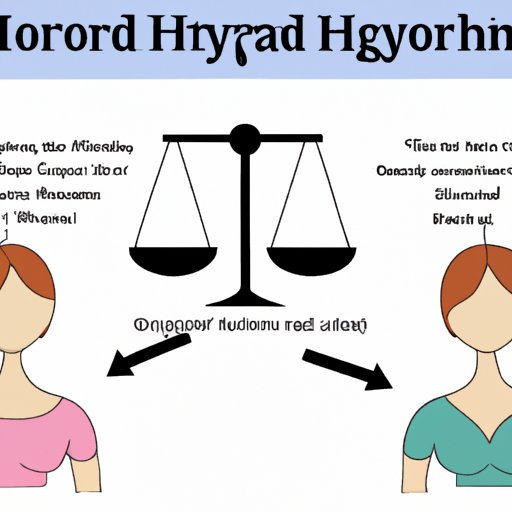
I. Introduction
If you have hypothyroidism, you may have experienced frustration with trying to lose weight. Weight gain is a common symptom of hypothyroidism, and it can be difficult to manage. However, it is possible to lose weight with hypothyroidism by understanding the connection between hypothyroidism, diet, exercise, and medications.

II. Hypothyroidism and Weight Gain: Understanding the Connection
Hypothyroidism is a condition where the thyroid gland doesn’t produce enough hormones. The thyroid hormones regulate metabolism, so when they are low, the body’s metabolism slows down. This slowdown can lead to weight gain, even if you are eating the same amount of food as you did before.
In addition to slowed metabolism, there are other symptoms of hypothyroidism that can contribute to weight gain. These include fatigue, depression, and decreased activity levels.
III. The Role of Diet and Exercise in Managing Hypothyroidism and Weight Loss
While hypothyroidism can make weight loss more challenging, a healthy diet and regular exercise are still essential for weight management. A diet rich in whole, nutrient-dense foods can support metabolism and energy levels. Regular physical activity can also boost metabolism and improve mood.
When creating a healthy diet plan, focus on whole, unprocessed foods that are rich in nutrients. Limit processed foods and sugars, which can contribute to inflammation and hormone imbalances. Incorporate a variety of fruits, vegetables, lean proteins, and healthy fats into your meals.
When it comes to exercise, find activities that you enjoy and that fit into your lifestyle. Start with small goals, such as taking a short walk every day or trying a new fitness class. Gradually increase your activity levels as you feel comfortable.
IV. The Best Workouts for Hypothyroidism and Losing Weight
While all exercise is beneficial for weight management and overall health, certain types of exercise may be more effective for people with hypothyroidism. Strength training, in particular, can help boost metabolism and improve muscle mass. Other effective workouts include low-impact cardio activities such as walking, cycling, and swimming.
However, some types of exercise may be more challenging for people with hypothyroidism. High-intensity workouts can be harder to manage if you are struggling with fatigue or low energy levels. Listen to your body and adjust your workout routine accordingly.
V. How to Lose Weight with Hypothyroidism: Tips from Experts
To get expert advice on losing weight with hypothyroidism, we spoke with professionals in endocrinology, nutrition, and fitness. Some of their tips include:
– Finding a doctor who is knowledgeable about hypothyroidism and can help you manage your condition
– Keeping track of your food intake and being mindful of portion sizes
– Experimenting with different types of exercise and finding what works for you
– Incorporating stress-management techniques, such as yoga or meditation, to manage cortisol levels
– Building a support network of friends, family, and medical professionals to help you stay motivated and on track
VI. Exploring the Use of Medications in Managing Hypothyroidism and Weight Loss
While diet and exercise are essential components of weight management with hypothyroidism, medications may also play a role in some cases. Thyroid hormone replacement therapy can help regulate hormone levels and boost metabolism, leading to weight loss.
However, it is important to work closely with a doctor when considering medication for hypothyroidism. Different medications may have different side effects and may interact with other medications you are taking.
VII. Success Stories: Real People Who Lost Weight Despite Their Hypothyroidism
Real people have successfully lost weight despite dealing with hypothyroidism. Some of the strategies they used include:
– Working with a knowledgeable doctor and understanding how their medications impact their weight
– Keeping track of food intake and monitoring portion sizes
– Exercising regularly, even if it’s just for a few minutes a day
– Sticking to a consistent sleep schedule
– Finding support from friends, family, and support groups
VIII. The Importance of Seeking Professional Help When Trying to Lose Weight with Hypothyroidism
If you are struggling with weight management and hypothyroidism, it is important to seek professional help. A doctor or endocrinologist can help manage your condition and provide guidance on healthy weight management strategies.
It’s also important to have a support network of friends and family who can encourage you along the way. Remember that weight loss can be a challenging journey, but it is possible with the right tools and support.
IX. Conclusion
While hypothyroidism can make weight loss more difficult, it is still possible to achieve a healthy weight through a combination of diet, exercise, medication, and support. Remember to focus on nutrient-dense foods, find exercise that you enjoy, and work closely with a doctor to manage your condition. With the right tools and mindset, you can achieve your weight loss goals despite hypothyroidism.





